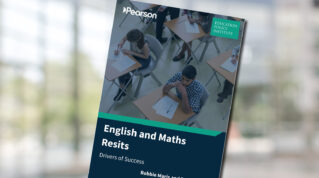Bed and breakfast bookings, student sleepovers, extra minibuses and parents taking the day off work are among the measures families and colleges have taken to get learners to exams on time as a result of rail strikes this week.
FE leaders have outlined the efforts students have made as thousands of services have been cancelled as part of national rail strikes on Tuesday, Thursday and Saturday this week.
Colleges have also had to foot the bill for any extra measures they have put on, such as minibuses or taxis, from their own budgets.
The strikes, organised by the Rail, Maritime and Transport workers’ union (RMT) over pay and conditions, landed during exam season, leaving students who use the rail network having to get to college by other means.
Official data for June 2022 A-level entries indicated nearly 90,000 students were sitting maths exams, one of which was held on Tuesday, with nearly 55,000 chemistry A-level entries on Thursday.
Many hopped on to buses, or stayed with friends who live closer to their college. But others had to go to longer lengths.
Phil Tranter, vice-principal at Hereford Sixth Form College, said: “Some are having to stay in B&Bs in Hereford.
“It’s not just one night they have to spend, for some it is two nights,” he said, depending on how their exams fell or when the last trains home were running.
“Lots of others are staying with friends,” he continued. “And if they cannot get in, we have had to put on taxis for some students.
“Some parents are having to take the day off. I have had quite a few students getting in at 7am saying it’s the only way mum or dad could get them here in time.”
The college moved to virtual teaching for some students who couldn’t make it in this week.
“We have almost had to go back to Covid for students who couldn’t get to us,” Tranter said.
He said for some students this week may be the first time they have sat an exam, meaning travel disruption has added additional pressure or stress at a time of already-heightened anxiety.
John Laramy, Exeter College principal, said: “Since the announcement about the train strikes, our personal tutors and wellbeing team have worked with students to ensure that any students that would be impacted were able to access the college on the day of their exam.
“This worked so well that, so far, Exeter College is not aware of any students at all who have missed an exam due to the rail strikes.
“Clearly the timing of the strikes has given students who have not previously sat formal exams additional challenges to navigate, therefore our exams team are fully aware of the different special considerations that are available to reassure students.”
Guy Francis, assistant principal at Brockenhurst College in Hampshire, said: “Students with lessons were advised to use our extensive bus network instead of the train. As a failsafe alternative, they could access quality learning online thanks to our blended learning contingency strategy. In exceptional cases, taxis and minibuses were arranged for students sitting exams.”
Many colleges and sixth forms had used the time between the strikes being announced earlier in June and Tuesday’s first day of action to signpost students to bus routes or encourage car sharing.
In many instances, students who thought they may struggle this week were asked to flag concerns early so arrangements could be made.
In Oxfordshire, The Henley College recommended that students sitting exams leave at least two hours to get in, and moved some of its courses to online study for the week to minimise disruption.
In a blog last week, the DfE said it “did not expect exams to be rescheduled because of the strike,” because “this would not be fair on students”.
It added that it expected providers to “draw on existing contingency arrangements” – which included providers’ own budgets – where alternative arrangements needed to be made for students.
The Joint Council for Qualifications in its guidance for this summer’s exams outlined some flexibility, which included the ability for centres to vary start times by 30 minutes and other measures around start times and invigilators.

















Your thoughts